Spencer Sherman
- 1985
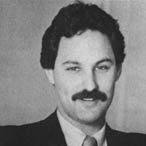
Fellowship Title:
- The Struggle of the Hmong in America
Fellowship Year:
- 1985
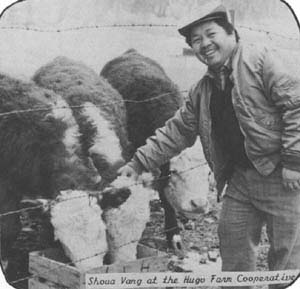
Charting A Course To The American Dream
MERCED, Calif.–One hand rises slowly into the air from the back of a room overflowing with Southeast Asian refugees. Another hand pops up in the front. A third hand timidly reaches upwards. The other 200 refugees in the bare room do not raise their hands, unable to say they have jobs or know someone who does. Outside, a winter rain falls on Merced, California, a small city in the rural San Joaquin Valley, where 30,000 Southeast Asians have moved since 1981. Ninety percent of the refugees are unemployed, subsisting on public welfare and food grown in community gardens. They are Hmong refugees from the highlands of Laos, organized by the U.S. CIA during the Vietnam War to fight North Vietnamese and Lao communists. They are unskilled, unsophisticated in American life and living on the bottom of the economic ladder, untrained in how to climb the economic rungs. At the front of the room sits Dang Moua, director of the Hmong community association in Merced. Dang Moua is one of a small group of Hmong who
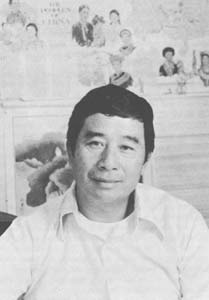
The Hmong’s Blue Ridge Refuge
MARION, North Carolina–Eloise Witte first heard about the Laotian refugees coming into the county when she read it in the McDowell News. Then she started seeing them peering into shops on Main Street and buying pants and shirts at Belk’s. Most of the women were “pregnant out to here,” she says with a smirk, and they were carrying six or seven more babies in their hands, in carts, in slings, in just about everything but strollers. When 25-pound bags of rice began appearing in the grocery store in the fall of 1980 and Mike Gibson at the Social Services department asked for some tax money to hire a refugee worker, Mrs. Witte could see the specter of change coming to McDowell County, and she was none too pleased. Then she heard several local churches were responsible for bringing the Asians into the county, and she “just got riled up.” If it was the churches bringing them in, it better be the churches paying their way, she thought. She guessed the deacons would be “walking straight
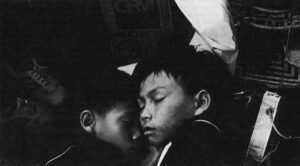
Resettling the Hmong
It didn’t unravel all at once. In Santa Ana, south of Los Angeles, some say the resettlement of the Hmong began to come apart in 1981 with the robbery and murder of an elderly refugee. Others say it began when leaders of the former CIA “secret army” in Laos called for their troops to gather in one place and prepare for a return to the homeland, high in the mountains of Indochina overlooking North Vietnam. In other parts of Southern California it began to come apart a little earlier, in late 1979. The number of Hmong families at first dwindled and for no clear reason. Then, like a torrent, they moved out of Los Angeles and its surrounding suburbs. In Philadelphia the pressure built over several years as blacks in the city’s ghettos attacked the newcomers from Southeast Asia. The soldiers and families of the secret army were competing for housing, jobs and welfare dollars. The tension led to sidewalk attacks on refugee men. A window was shot out of a Hmong house and threats
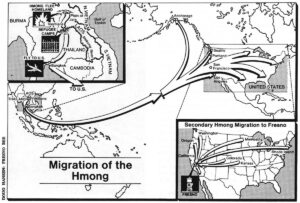
Waking up on the Moon: The Hmong in America
FRESNO, California–Making her way through hundreds of Indochinese refugees waiting for English class to begin, Barbara Christl shakes her head as she holds out the morning newspaper. “Here. This is the problem,” she says, heaving the paper on her desk. The day’s front page feature is a ten-years-after look at refugees from the Vietnam War. The headline says, “Indochinese Refugees Adapt Quickly in U.S.” The story opens describing a Vietnamese man in Houston who came to the United States a decade ago with nothing. Today he is on his way to becoming a “Texas tycoon.” The piece quotes a former official of the U.S. Commission on Immigration and Refugee Policy as saying Indochinese refugees have “shown a remarkable ability to enter into mainstream American economic life.” Christl, director of English as a Second Language programs for Fresno County, looks like she is ready to scold a child. “You see, people think the problem has gone away. Or if not, that things are moving in that direction.” Here, the problem has just begun. Since 1979 the
